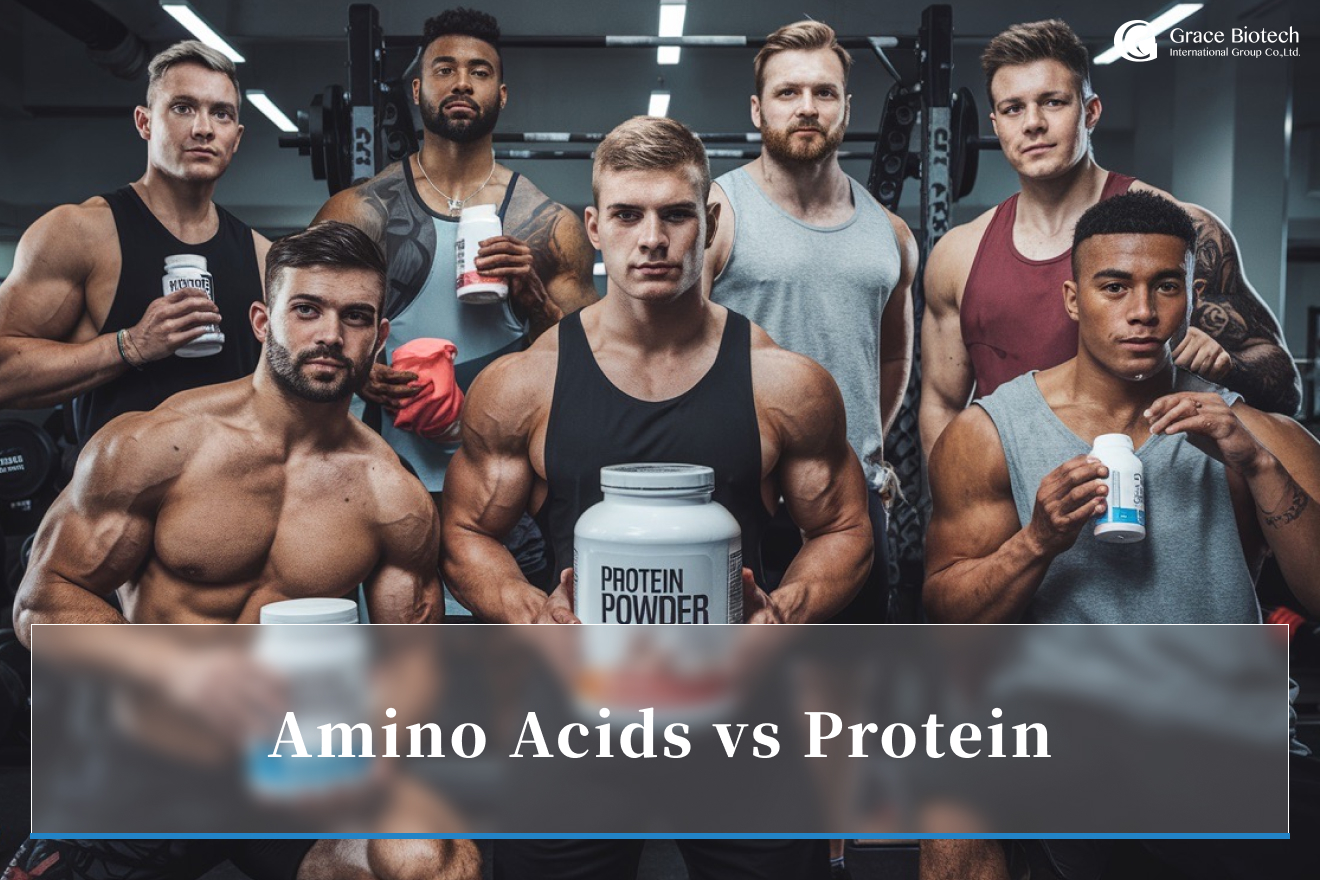Latest
News
Amino Acids vs Whole Protein: What are the Differences?

Learn the key differences between amino acids and proteins, their roles in muscle growth, and why balancing both is essential for health and performance.
| Table of Contents: |
|
Difference Between Amino Acids and Whole Protein Why Should You Take Amino Acid Supplements? Fuel Your Success: Amino Acids, Proteins, and a Trusted Partner |
When it comes to building muscle, many people think that eating more protein is the key. However, it's not just about the amount of protein you consume; the amino acids within that protein play a crucial role too. Understanding the difference between amino acids and whole proteins can help you improve your diet for muscle growth and overall health.
What are Amino Acids?
Amino acids are organic compounds that combine to form proteins, serving as the fundamental building blocks of life. They play crucial roles in various bodily functions, including tissue repair, nutrient absorption, and synthesizing enzymes and hormones. There are 20 different amino acids and they can be categorized into three groups:
-
Essential Amino Acids: These nine amino acids cannot be produced by the body and must be obtained through diet. They include histidine, isoleucine, leucine, lysine, methionine, phenylalanine, threonine, tryptophan, and valine.
-
Non-Essential Amino Acids: Eleven amino acids that the body can synthesize on its own, such as alanine, asparagine, aspartic acid, and glutamic acid.
-
Conditionally Essential Amino Acids: Amino acids that are usually non-essential but become essential under certain conditions like illness or stress, including arginine, cysteine, glutamine, tyrosine, glycine, proline, and serine.
Benefits of Amino Acids
Amino acids are vital for numerous physiological processes:
-
Protein Synthesis: They are the building blocks for proteins, which are essential for muscle growth and repair.
-
Enzyme Production: Amino acids contribute to the formation of enzymes that facilitate biochemical reactions in the body.
-
Neurotransmitter Synthesis: Certain amino acids are precursors to neurotransmitters, influencing mood and cognitive function.
-
Immune Function: They play a role in the production of antibodies, supporting the immune system.
-
Energy Production: Amino acids can be utilized by the body as a source of energy, especially during prolonged exercise or periods of fasting.
Difference Between Amino Acids and Whole Protein

Proteins and amino acids are closely related, but they differ in structure, function, and how the body uses them.
Proteins are large, complex molecules made up of long chains of amino acids folded into specific shapes. These proteins are found in foods like meat, fish, eggs, dairy, legumes, and nuts. When consumed, the body breaks down proteins into individual amino acids during digestion. These amino acids are absorbed into the bloodstream and used for vital body functions.
Amino acids, on the other hand, are the smaller building blocks of proteins. There are 20 standard amino acids, including essential ones that must come from the diet and non-essential ones the body can produce. Consuming "complete proteins" (like those from animal-based foods) ensures the body gets all nine essential amino acids, while plant-based proteins often need to be combined to achieve the same effect.
The digestion and absorption rates also differ.
Proteins take longer to digest as they need to be broken down into single amino acids that enter the human’s bloodstream. Our body can then use these amino acids to build new proteins. In contrast, free-form amino acid supplements are already in their simplest form, allowing for faster absorption for the body. This makes amino acids especially beneficial after workouts when quick muscle recovery is needed.
Why Should You Take Amino Acid Supplements?
Amino acid supplements have gained popularity for their potential health benefits, particularly among individuals engaged in intense physical activities. These supplements can play a significant role in muscle growth, recovery, and overall well-being.
-
Muscle Growth and Repair: Supplementing with amino acids, especially branched-chain amino acids (BCAAs) like leucine, isoleucine, and valine, can enhance muscle protein synthesis. This process is crucial for increasing muscle mass and repairing tissues after strenuous workouts.
-
Enhanced Exercise Performance: Consuming amino acid supplements before or during exercise may improve endurance and reduce fatigue. BCAAs, in particular, can be oxidized by skeletal muscle and used as energy during exercise, potentially enhancing performance.
-
Improved Recovery: Post-exercise muscle soreness and damage can hinder training progress. Amino acid supplementation has been shown to decrease levels of creatine kinase, an indicator of muscle damage, leading to improved recovery times and reduced muscle soreness.
-
Support for Immune Function: Amino acids play a role in the production of antibodies, supporting the immune system. Adequate intake can help maintain immune function, which is particularly important during periods of intense training or stress.
-
Energy Production: During prolonged exercise or periods of fasting, amino acids can be utilized by the body as a source of energy, helping to sustain performance and prevent muscle breakdown.
While amino acid supplements can provide targeted and rapid benefits, they don’t satisfy your whole daily protein needs. Whole protein foods also deliver additional nutrients like vitamins, minerals, and other beneficial compounds or other essential types of amino acids.
It's crucial to consult with a healthcare professional before starting any supplementation, as individual needs can vary, and excessive intake of certain amino acids may have adverse effects, such as metabolic imbalances.
To sum up, one thing is always true: you must consume enough of all essential amino acids daily to ensure your cells can create the proteins necessary for vital functions. That’s why balancing the consumption of both amino acids and whole proteins is key to supporting muscle growth and maintaining your overall wellness.
Fuel Your Success: Amino Acids, Proteins, and a Trusted Partner
Amino acids and proteins are the building blocks of health, each playing a unique role in muscle growth, recovery, and overall well-being. While proteins provide a complete nutrient package essential for long-term health, amino acids deliver targeted benefits with quick absorption, making them ideal for immediate post-workout recovery or specific health needs. Together, they form the cornerstone of effective nutrition, emphasizing the importance of balance and variety in your diet.
When it comes to creating your own line of supplements, whether it’s protein shakes, amino acids, or protein powders, having a trusted partner like Grace Biotech can make all the difference. Our expertise, cutting-edge manufacturing processes, and unwavering commitment to quality ensure your brand delivers exceptional products that meet consumer demands. Whether you're curious about how to sell supplements, planning how to start a supplement company, or searching for a reliable contract supplement manufacturer, we’re here to bring your vision to life. Partner with Grace Biotech today and take the next big step toward a thriving supplement brand!
You May Also Be Interested In:

